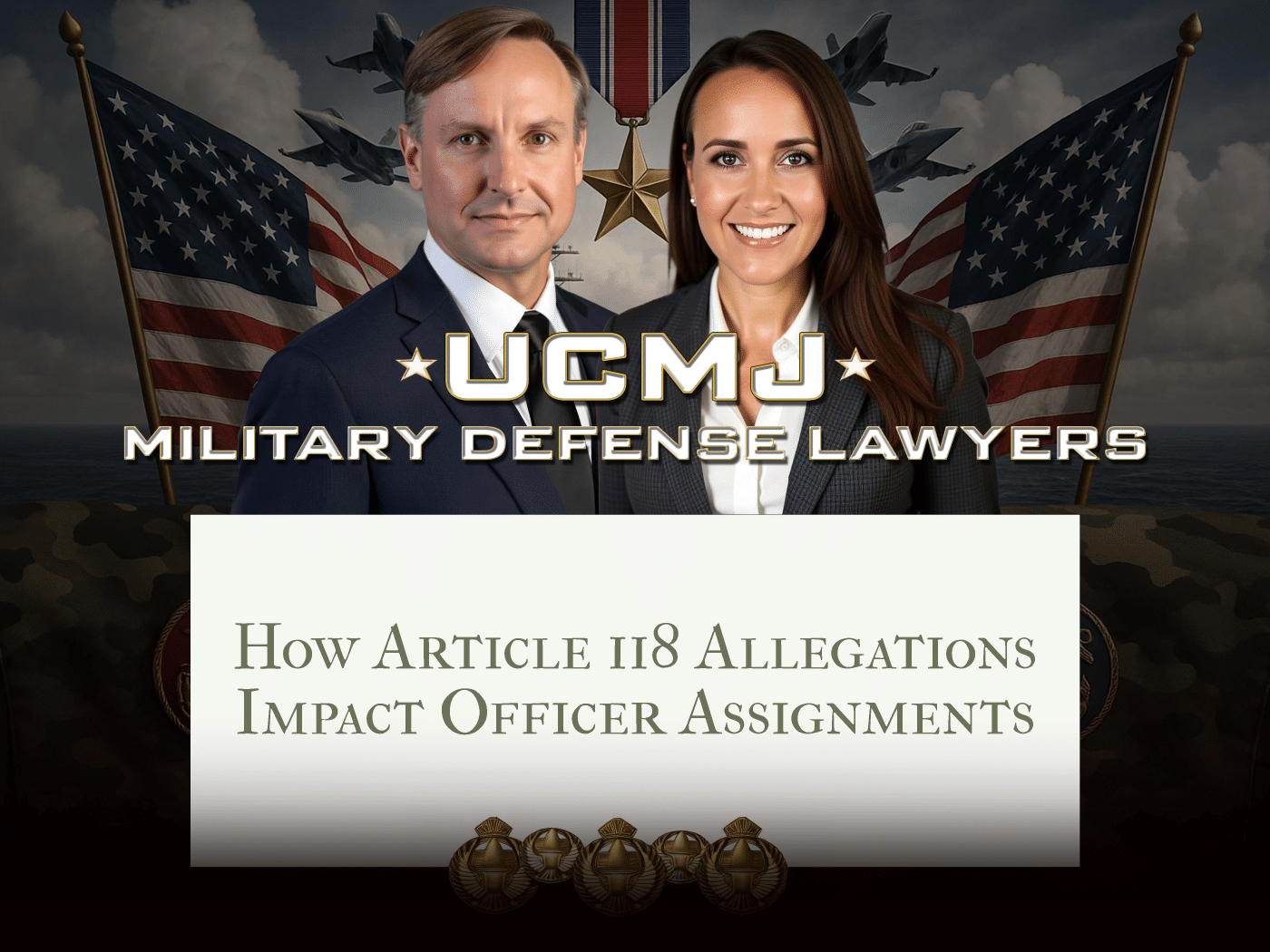When a military officer faces allegations under Article 118 of the Uniform Code of Military Justice (UCMJ), it doesn’t just affect them legally—it has a profound effect on their career, reputation, and future assignments. Article 118 Assignment Issues often become a complex topic for service members and their families as it covers accusations of murder, one of the most serious charges in the military justice system. While most might think such cases are rare, when they occur, they trigger a wide range of consequences, from immediate suspension from duties to long-term impact on one’s assignment track. If you or someone you know is dealing with Article 118 Assignment Issues, you’re likely feeling overwhelmed, uncertain, and concerned about what happens next. You’re not alone, and understanding the implications and your options is the first step toward regaining control and safeguarding what you’ve worked hard to achieve. This article aims to clearly explain how Article 118 allegations impact assignments and how to navigate those challenges effectively.
Clarifying the Issue Behind Article 118 Assignment Problems
Article 118 of the UCMJ pertains to the unlawful killing of another person with premeditation or malice. When someone in the military is accused of this crime, it triggers significant complications related to their current duty assignments and future military career. These are known as Article 118 Assignment Issues. Because murder is one of the most severe offenses, allegations alone, even without a conviction, can cause immediate changes to an officer’s role and security clearance status.
For example, if an officer deployed overseas is named in an ongoing Article 118 investigation, they may be pulled from their position and sent stateside pending the outcome. Another case may involve an officer up for promotion or a new command who suddenly becomes ineligible due to allegations alone. In both situations, the officer’s assignment opportunities are directly and negatively affected. These outcomes underscore the seriousness of assignment complications that can arise from Article 118 allegations, even before any legal resolution occurs.
Why These Assignment Complications Are Important to Understand
Understanding how Article 118 allegations can disrupt officer assignments is critical because even unsubstantiated claims can sideline a promising career. Assignments in the military are more than just geographical locations; they are steppingstones tied to prestige, promotion, and fulfillment of duty. When those paths are disrupted by unresolved allegations, the consequences extend well beyond the individual—they affect teams, missions, and military readiness.
Whether an officer is preparing for deployment, heading into a key leadership role, or transitioning out of service, the impact of Article 118 Assignment Issues can cause emotional strain, administrative delays, and long-term career uncertainty. By recognizing how these issues unfold, service members and their families can make informed decisions and seek the right legal guidance sooner.
- Scenario 1 and consequence 1: A company commander is suspected of an Article 118 offense and placed on administrative leave. As a result, their battalion assignment is revoked, and they lose months of leadership experience that would have qualified them for higher command.
- Scenario 2 and consequence 2: An overseas officer is accused while stationed in a conflict zone. The military removes them and halts their security clearance, ruining trust with allied forces and requiring months of replacement training for a new officer.
- Scenario 3 and consequence 3: A newly promoted officer awaiting orders is suddenly accused of misconduct under Article 118. The PCS (Permanent Change of Station) orders are canceled, and housing, family arrangements, and educational plans are left in limbo.
Breaking Down What Happens: The Article 118 Assignment Process Explained
- Step 1: Once an allegation is reported, the accused service member is often placed under investigation, during which time they may be reassigned temporarily or released from current duties.
- Step 2: If the investigation finds credible cause, formal charges may be filed. At this point, commands will likely revoke pending orders, cancel promotions, or block assignment moves.
- Step 3: If court-martial proceedings follow, the officer will be taken off the assignment roster until the case is resolved. Even if acquitted, restoring previous assignments and career trajectories remains challenging.
Pro Tips for Navigating Article 118 Assignment Challenges Successfully
Common Questions Regarding Article 118 Assignment Outcomes
How Gonzalez & Waddington Supports You Through These Complex Cases
With decades of experience in military criminal defense, Gonzalez & Waddington have built a strong reputation supporting service members facing serious allegations like those under Article 118. Our team understands how Article 118 Assignment Issues can derail promising careers. That’s why we act quickly to protect your assignment status, advocate during administrative reviews, and prepare powerful legal defenses. We’ve represented clients across all branches worldwide, gaining deep insight into how different commands handle assignment complications. Clients trust us not just for our legal capability, but also because we understand the emotional and operational toll these allegations take. With Gonzalez & Waddington, you gain a legal partner who fights for your freedom, your career, and your future. Our track record speaks for itself—we bring clarity, compassion, and strategy to every case.


